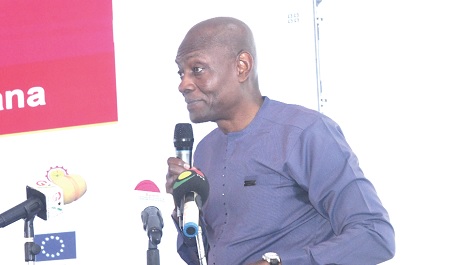The Minister of Education, Haruna Iddrisu, has entreated captains of industry to open up more opportunities for internship, apprenticeship and workplace learning to bridge the gap between school training and industry demands.
He said such experience would not only enable students understand the world of work better, but would also help institutions to design their curricula in line with best practices while contributing to labour market intelligence.
“I am, therefore, calling on you to be deeply involved in shaping our curricula so that they match the technologies, standards and processes of your industries,” Mr Iddrisu added.
This was contained in a speech read on his behalf by the Director of TVET at the ministry, Rejoice Danquah, at the second national roundtable for private sector engagement and partnership in Technical and Vocational Education and Training (TVET) in Accra yesterday.
The dialogue was organised by the Commission for Technical and Vocational Education and Training (CTVET), with support from the German Development Agency (GIZ).
It brought together various stakeholders from government, industry, training institutions and development partners.
Among issues discussed were how dialogue between the public and private sectors could be institutionalised for long-term impact, best practices and new ideas for sustainable partnerships in skills development.
Collaboration
The minister stressed that TVET should no longer be seen as a secondary option but as the “engine for industrial transformation, job creation and inclusive growth.”
He said that the country’s competitiveness under the African Continental Free Trade Area (AfCFTA) would depend on how quick and effective industry and training institutions collaborated.
To address gaps in the sector, the minister announced plans to institutionalise regular dialogue platforms between industry and training institutions, present a comprehensive National TVET Policy to Cabinet, and establish a dedicated TVET Fund without imposing new taxes.
Partnerships
The Director-General of CTVET, Zakaria Sulemana, elaborated on the establishment of 16 sector skills bodies (SSBs) across key sectors—agriculture, construction, ICT, health, tourism, and manufacturing, as platforms for continuous collaboration between training providers and employers.
![]()
He also emphasised industry–TVET partnerships, expanding workplace learning, and promoting inclusivity for women, persons with disabilities and disadvantaged groups in skills development.
The Portfolio Coordinator for the Development Cooperation Team at the German Embassy, Chantel Kristin Chantel Kristin Lahmer, hailed 50 years of Ghana–Germany cooperation, and reaffirmed Germany’s commitment to Ghana’s TVET transformation.
She cited gains such as workplace learning, a national TVET policy, green curricula, IT training and higher female enrolment, while pledging continued EU-backed support.
Action
The panel discussion on public–private collaboration in skills development emphasised the need to shift from talk to action. Speakers said education must align with industry needs, with partnerships in emerging fields like renewable energy and drone technology showing promising results.
They stressed the importance of national policies to drive innovations such as biodigester technology, which held potential for job creation across multiple sectors.
The panellists further called for investment in simulators and hands-on training.

